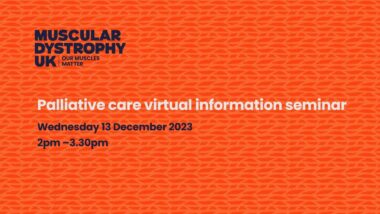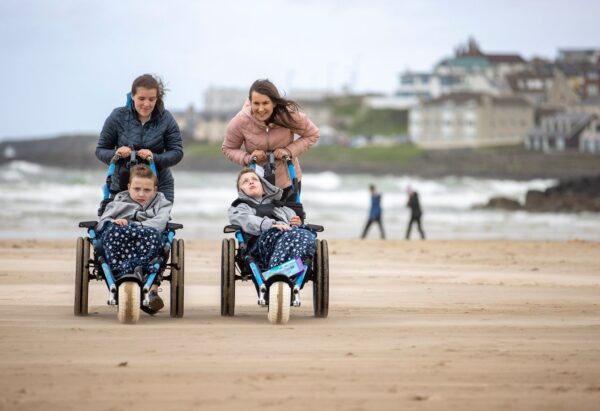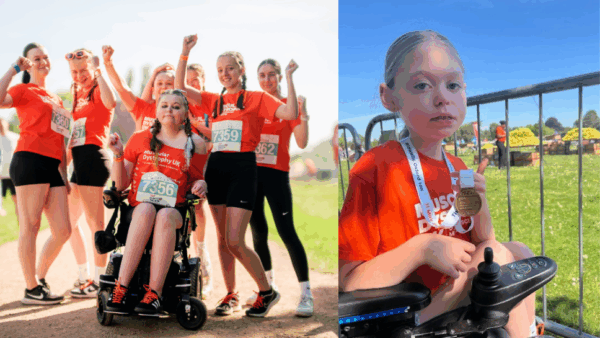This Palliative Care Week, Brian shares his involvement in paediatric palliative care research, why it’s important to him, and some of the misunderstandings about what palliative care is. Brian has been involved with our charity since 1992.
“Palliative care isn’t just end of life care”

A lot of people think that palliative care is end of life care, but that’s not true. It’s about all of life care.
“Someone with a life-limiting condition could live for 20, 30 years or more and still come under palliative care. That was the case with our son, Chris, who had Becker muscular dystrophy. ”
Volunteering with the Paediatric Palliative Care Research Group and Kings College London to improve paediatric palliative care has become such an important aspect of my life.
Long-term care at Newcastle hospitals
My family have been actively involved with Muscular Dystrophy UK since the early 1990s when my son was diagnosed with Becker. Back then, there were no neuromuscular specialists in our area, so the charity suggested we contact Newcastle hospitals. Despite being a 250-mile round trip, it was well worth the journey to be seen at an internationally renowned centre for neuromuscular conditions. It is essential that children with muscle wasting conditions can be seen by specialists in the field.
Our son’s philosophy in life was to live it to the full. His determination, along with an expert clinical team and his family and friends support, allowed this to happen. He developed a love for music which led to him becoming a drummer, DJ, singer and forming rock bands. He wasn’t that interested in his condition, he left that up to his family. He just got on with life. This involved many holiday adventures around the world, attending music concerts and American wrestling events. Chris had a personality that allowed him to talk to anyone from whatever walk of life and made countless friends. We will always be extremely proud of him.
“We were so grateful that Chris was able to receive care at Newcastle from the same team for the remainder of his 36 years of life.”
It meant his consultant, cardiologist and physio knew Chris inside out, which made things that little bit easier when his condition progressed. It upsets me that not everyone has this opportunity, and I wanted to be involved in improving standards of care for people with muscle wasting conditions.
Improving standards of care with the Paediatric Palliative Care Research Group, University of York
I chaired the Muscular Dystrophy UK Yorkshire and Humber Muscle Group for 15 years from when it first started. In the final meeting we had before the pandemic, Professor Lorna Fraser attended to speak about her work. I was very interested in the paediatric palliative care work she was carrying out at the Martin House Research Centre, now renamed as the Paediatric Palliative Care Research Group, University of York. She asked if I would consider being part of the Patient and Public Involvement (PPI) side of the research and I haven’t looked back since.
The Paediatric Palliative Care Research Group was launched six years ago with the aim to improve standards of care. I’ve been involved in the project for more than three years in a number of capacities.
“I proof some of the research papers that have been turned into plain English summaries to make sure the general public can understand them. I’m also on the advisory board, who provide thoughts and advise on the research projects from different points of view.”
The centre has published more than 20 reports since it was set up, ranging from the impact of diet for children fed through a gastrostomy (feeding tube), to care in the community for people with neuromuscular conditions. I always try and look after the interests of those with muscle wasting conditions and consider how this could improve life for families in our community.
Branching out with Kings College London
More recently I’ve become involved in the new paediatric palliative care research project set up by Kings College London. It’s a great step in the field as it is part of the world-renowned Cicely Saunders Palliative Care Institute. They’ve created a parent advisory group with 15 of us who provide advice and recommendations based on lived experiences.
Collaboration is key
Now there are more studies being done in this area, the Collaborative Paediatric Palliative Care Research Network (CoPPAR) aims to develop a network of academics and clinicians to provide a single point of information for parents, clinicians and academics to enable them to find out about current and new research studies and how to get involved.
How you can help improve standards of care
I’m so pleased that paediatric palliative care has started to be seen as at least equally important as adult palliative care. I hope this’ll bring in more funding for new research to help improve standards of care, but also raise awareness and dispel some of the misconceptions about paediatric palliative care.
If we don’t raise awareness about this topic, we won’t increase funding or community involvement. It’s a sensitive area for many people, but I would encourage anyone who has the time and wants to improve research in this field to get involved.
“Our community have so many helpful insights and experiences that can help improve standards of care for people with muscle wasting conditions.”
Learn more about paediatric palliative care research and how you can get involved below:
- Paediatric palliative care research. Learn more about paediatric palliative care research and how you can get involved. University of York, Kings College London
- Palliative Care: Virtual information seminar (2023). This webinar covers information on palliative care for people living with muscle weakening and wasting conditions.

- Local services. Find specialist neuromuscular care near you.


